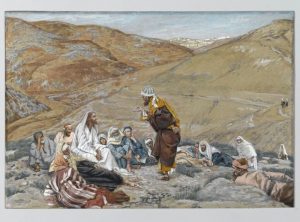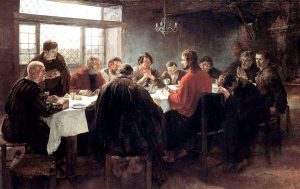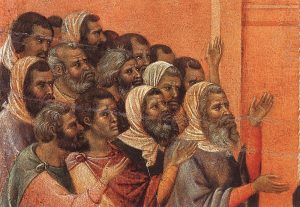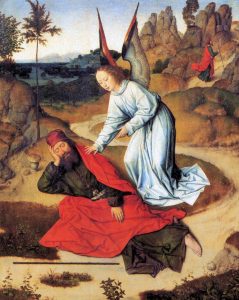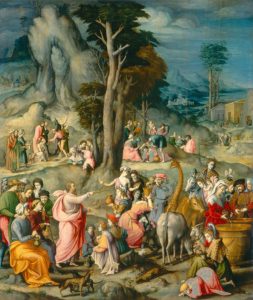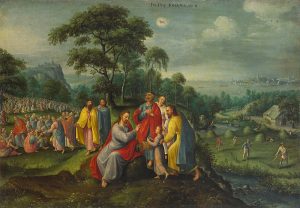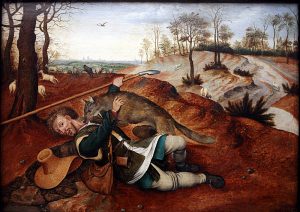Thoughts on Sunday’s Lessons for Sept. 8, 2024 (Pentecost 16B/Proper 18)
Season of Creation: Learn Sunday
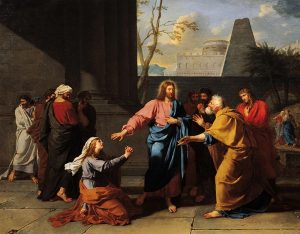
Le Christ et la Cananéenne (Christ and the Woman of Canaan, 1784), oil painting on canvas by Jean Germain Drouais (1763-1788). The Louvre, Paris. (Click image to enlarge.)
First Reading (Track One): Proverbs 22:1-2, 8-9, 22-23
Creation Focus: Created order is built for justice.
This Sunday we turn to the book of Proverbs, another work of wisdom literature that, like the Song of Solomon that we heard last week, was thought in older times to have been written by King Solomon himself. Many of its simple, timeless aphorisms might remind us of such modern works as Benjamin Franklin’s Poor Richard’s Almanack or the Old Farmer’s Almanac, and much of its wisdom seems as applicable now as it did 2,500 years ago. More significantly, its memorable poetic verses remind us that God’s covenant with the people gives preference to the poor and demands justice for them: “Do not rob the poor because they are poor, or crush the afflicted at the gate; for the Lord pleads their cause and despoils of life those who despoil them.”
First Reading (Track Two): Isaiah 35:4-7a
Creation Focus: Renewal and healing of all creation is coming!
God feeds the hungry, gives drink to the thirsty, heals the blind and the deaf and takes the side of the oppressed, and we are called to do the same. This call for renewal and healing through distributive justice resonates through Sunday’s readings. Our Track Two first reading reveals the Prophet Isaiah sounding such a call. Speaking from exile in Babylon, Isaiah urges the people to remain strong and fearless as God comes to save them and their land. The fortunes of war have sent them into exile and separated them from home and Temple, Isaiah sings. But, he gods on, God is coming with healing and comfort and will lead them back home. God will open their eyes and ears as Earth and waters and all creation are restored in speech and sing their joy.
Psalm (Track One): Psalm 125
Creation Focus: Rulers bend to the unjust; God is an unshakable mountain.
One of the shortest of the Psalms, Psalm 125 consists of only five verses. Yet within this brief space, the Psalm celebrates the justice of God’s covenant with full voice. Those who trust in God, the Psalmist sings, can no more be moved than can Mount Zion, where the Temple stands. Even if wicked rulers hold sway, God stands around the people as the hills rise around Jerusalem, fixed and strong forever. God rewards those who are good and pure in heart, but those who turn to evil ways will be sent away with the evildoers.
Psalm (Track Two): Psalm 146
Creation Focus: Do not trust in rulers; trust in God’s way of restoration.
Do not trust in earthly rulers, the Psalmist warns in this hymn of praise for God’s justice: They cannot help us in the long run. When they die and return to earth, their thoughts die with them. Place our hope in God instead, who created the earth and all that is in it, and who reigns forever. God’s caring justice favors those most in need: the poor and the oppressed, hungry people, prisoners, those who are blind; the stranger, the widow, the orphan; those weighed down by life’s load. In caring for the least among us, God cares deeply for us all.
Second Reading: James 2:1-17
Creation Focus: The rich are oppressors; ensure all have enough.
The letter of James gets straight to its theological point this week: It does no good if you offer a hungry or naked brother or sister only your warm wishes but no food or clothing. If you don’t give them what they need, what good is that? This advice should speak as clearly to us today as it did to its first century audience. What if a homeless person came to our church today, looking for a haircut and a bath? Would we greet that person as warmly as a wealthy, well-dressed parishioner? God expects us to love all our neighbors, rich and poor alike, James reminds us. Kind words alone are not enough; faith without such works is dead.
Gospel: Mark 7:24-37
Creation Focus: All have a right to enough equally; open our ears.
Jesus is traveling in Gentile country when a Canaanite woman with a sick child approaches him in hope. He responds surprisingly with a nasty insult, calling her children dogs, unworthy to eat scraps of their food! How can this be? Is this a true story of the Jesus we worship and love? There’s a lot of theological and scriptural unpacking to be done here, but perhaps we’re seeing Jesus’ fully human side. Then, when the woman’s faith empowers her to challenge Jesus, he listens, hid harsh attitude seemingly softens, and he heals her child. Then the page turns, and without further recriminations he restores hearing and speech to the deaf Gentile man in the next town down the road.

